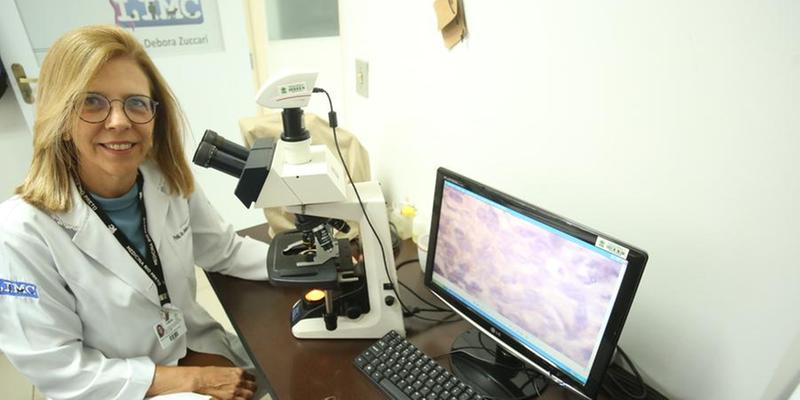Since it was discovered that leukemia patients, who were exposed to mustard gas in World War II, showed improvement in the disease, science has made great progress in discovering drugs that are able to prevent the multiplication of cancer cells in the body. At the beginning of the twentieth century, treatment was palliative and only guaranteed survival for the patient. In some cases, the effect of the drug was to treat cancer, but it had a devastating effect on the patient’s immunity, and could lead to death from other complications. Today, molecular research points the way to hope for detecting cancers, even before they show signs in the body. One of them, focused on breast cancer treatment, is headed by the Rio Preto School of Medicine.
This Sunday, November 27, is dedicated to the National Day Against Cancer, the second leading cause of death in Brazil, second only to heart disease. The National Cancer Institute (INCA) projects 704,000 new cases of cancer in Brazil in 2023, with the highest incidence in the southeastern region of Brazil, where prostate cancer is most common in men (77 per 100,000 population) and breast cancer in women (84) per 100,000 inhabitants).
Professor at the Department of Molecular Biology at Famerp, Débora Zuccari, coordinates the molecular investigation of breast cancer through liquid biopsy.
“Our work targets women with the ‘triple receptor negative’ subtype, which is more aggressive and resistant to common treatments. It affects 15% of patients, with a direct indication for surgery,” he explains.
The way the researchers work is to collect a blood sample from a vein for analysis in a laboratory.
“The goal is to identify proteins that may be considered biomarkers, that is, which are significantly decreased or increased in the bloodstream of patients with this type of diagnosis. The occurrence of the same protein in samples from different women can give us definitive answers about the development of cancer even before The appearance of any symptoms of the patient,” he says.
The researcher says the work is already contributing to the oncology treatment of about 30 women with the help of the Hospital de Besse, because the team of scientists maintains contact with doctors to share discoveries about the tumor’s genetic profile — information key to determining the most appropriate treatment for each case.
Funded by the São Paulo State Research Foundation (FAPESP), it is expected that by identifying biomarkers for triple negative breast cancer, the protein can be tracked in common blood tests offered by the Unified Health System.
“The impact of this discovery is huge, as it tends to revolutionize what we understand by early diagnosis. This has implications for treatment, as it increases the chances of recovery from the disease, and contributes to the efficiency of public spending on cancer treatments,” he says.
Famerp is also collaborating on research coordinated by Professor Carlos Rosa Jr., of Unesp in Araraquara, in developing drugs capable of strengthening the body’s defense systems so that the body eliminates cancer cells on its own in the head and neck region. The drug will stop the progression of the disease.
cancer
- Cancer is a term that includes more than 100 different types of malignant diseases that share the disordered growth of cells, which can invade nearby tissues or distant organs.
- A genetic mutation, that is, a change in the DNA of a cell, is the starting point for the onset of cancer. Because of this change, the cell starts receiving false information about its activities
- Cancer can arise anywhere in the body. However, some organs are affected more than others; And each organ, in turn, can be affected by different types of tumors, more or less aggressive
- Cancer can be treated with surgery, chemotherapy, radiation therapy, or a bone marrow transplant. In many cases, it is necessary to combine more than one method.
accurate diagnosis
Two patients with the same type of cancer may respond to treatment differently. The explanation lies in the analysis of the molecular profile, which determines the rate of cell proliferation, loss of function, invasive potency, and ability to undergo metastasis. Personalized treatment is the future of oncology, says Tamara Vega Faria, MD, PhD in health sciences and professor at Faceres.
And remember, understanding the functioning of genes has enabled science to develop targeted molecular drugs, that is, drugs that act directly on the tumor, produce fewer negative effects on the body (hair loss, mouth sores) and ensure a better treatment response.
“It is an area with many studies under development. There are not yet medicines for all proteins and therapies already approved are only available in the private network or in some hospitals through partnerships with research centers. But the expectation is that in the future, cancer will be a controlled disease, as HIV has become,” he says.
The expert states that through genetic mapping, it is possible to measure the percentage of the patient’s probability of developing cancer, in cases of family history.
However, it is important to stress that the hereditary factor affects only 10% of cancer cases. In 90%, genes are altered due to cigarettes, alcohol abuse, excessive consumption of fats and sugars, processed meats and foods high in sodium, “he adds. (GT)

“Wannabe internet buff. Future teen idol. Hardcore zombie guru. Gamer. Avid creator. Entrepreneur. Bacon ninja.”

